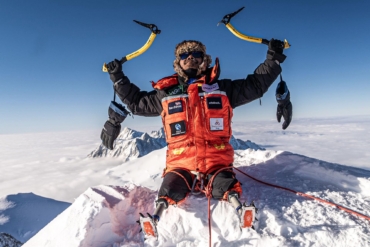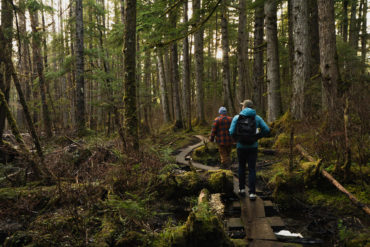When legendary alpinist Alex Lowe died in an avalanche on Oct. 5, 1999, he left behind three sons, a wife, and his best friend. ‘Torn,’ by Lowe’s son Max, tells the tangled story of the aftermath.
You don’t think about Alex Lowe having a gravestone. At least, I don’t. You think about him crushing it with Conrad Anker in Pakistan, the Himalayas, Antarctica. You think about late-night American talk shows asking him stories of his climbs, before America knew what a piton was.
You think about Alex Lowe as the greatest climber of a generation. “Torn” reveals the complicated and often painful aftermath navigated by Alex’s family — and climbing partner, Conrad Anker — in the wake of his untimely death. Whether you’re a dedicated climbing enthusiast and know of Alex’s legacy or not, this documentary will pull you in and keep you there — albeit at times, uncomfortably.
Ultimately, it’s a story emblematic of any harrowing tale: It’s full of pain, love, and complexity.
View this post on Instagram
‘Torn’: The Alex Lowe Story
But he does have a gravestone, and you see it 41 minutes into “Torn.” It’s at Shishapangma Base Camp, just below where an avalanche killed him in 1999.

It’s a squat stupa, situated in mud. There in basecamp, as the leaden reality of Lowe’s death sets in, Anker recites a deadpan statement to an American news outlet on the sat phone, signs off with only his name, and stares desolately into the bottom corner of the tent.
It doesn’t get less sad from there. If you feel happy or want to be in a good mood, don’t watch “Torn.”
It’s not that kind of a documentary — it’s not a celebration of a man’s life, it’s a dirge about what happens in the aftermath.
The entirety of what you’d call the happy part of the film fits inside the duration of the song “Sweet Emotion” by Aerosmith. The rock ballad serenades Anker and Lowe for 3:09 as they summarily rip through the hardest and raddest climbs they can dream up in the ’90s.
Then, abruptly, the two huddle inside a tent in Queen Maud Land, Antarctica. It’s Christmas, and their modest paper tree looks brown in the orange light. Photos of Max, Sam, Isaac, and Jenny Lowe adorn the tabletop. Lowe reads his Christmas mail to a befuddled Anker.
“I miss you. Come home soon,” Max’s letter says. Anker can muster no response; only stare into the orange nylon firmament three feet away.
Max Lowe’s “Torn” is a heart-rending, sentimental gift from the son of a father he never knew to himself. I’d love to say it’s a gift from Max Lowe to Alex Lowe, but it’s not. It’s a gift from Max Lowe to Max Lowe, well-acquainted with his grief and running out of patience.
Here’s what to expect from watching a 100-minute documentary about what happens in the wake of a father’s death.
Expedition Climber or Absentee Father? Alex Lowe Walks the Line
Jenni Lowe-Anker is not a lightweight. She’s a visual artist who makes a living selling her paintings in an upper midwestern mountain town. There’s a reason most people don’t try to do that: it’s hard as hell.
View this post on Instagram
So in the ’90s, when she was building her career and raising three kids virtually by herself while Alex gallivanted all over the world, her axe understandably developed an edge to grind.
In archived footage, an interviewer asks Alex how many months out of the year he spends away from home. After brief consideration, he answers (paraphrased): “I don’t know. You’d probably be better off asking Jenni that.”
Jenni also repeatedly talks about how difficult it could be to live with Alex; how he could be exacting and volatile. Especially, as climbing partners and family friends point out, if he didn’t get his climbing fix.
View this post on Instagram
‘The High Cost of Being Conrad Anker’
Everybody knows Conrad Anker is a world-class alpinist. Virtually no one questions his reputation, his methods, or his ethics.
Insofar as that assessment is patently accurate, it’s true except for two people: Max Lowe and Conrad Anker.
Anker’s commitment to Alex Lowe goes well beyond climbing. To call the real-life avatar he portrays in the film “ashen” would be like calling the sky “blue.”
True, Anker appears jubilant with Lowe in their early climbing days. Flaxen hair flowing, he doesn’t care that he’s playing second fiddle — he acknowledges it right off the bat. He’s just happy to be there and contribute.
View this post on Instagram
But after Lowe’s death, he grovels and frets his way through “Torn.” The famous Outside Magazine “Last Man Standing” headline says it all; 20 years down the road, one look at his face makes it evident that he smiled a lot more before his friend’s death. With little hesitation, he at one point discloses he’s entertained suicidal thoughts.
Amid the grief, marrying Lowe’s widow looks like a matter of course — a de facto trauma bond. Fathering Lowe’s sons is a charge Anker appears to accept with a deep fulfillment, more than with what you’d call happiness.
View this post on Instagram
Enter documentarian Max Lowe (note the unaltered surname). Throughout their interactions in “Torn,” the two navigate a domestic peace that seems, while meaningful and loving, hard-won.
Lowe is a Telemachus — the son of long-gone Odysseus, wary of suitors and exhausted by his perceived duty to defend his household.
View this post on Instagram
Calling the relationship adversarial might go too far. But, true to documentarian duty, Max asks pointed questions and waits for real answers. The results, in Anker’s case, are occasionally frightening.
Alex Lowe: The Concept
The farther away we get from a thing, the less real it becomes to us. Positionally, an object disappears as it shrinks in the rearview.
Asked how he’d describe Alex, middle son Sam admits he’s got no other way to do it than by talking about what he did. Sam and little brother Isaac were both so young when Alex died that they consider Anker their dad (and share his last name).
View this post on Instagram
Jenni and Conrad both talk about him with a plaintive wistfulness. As Jenni puts it, she saw marrying Conrad as a “validation” of Alex’s memory but also a conduit to moving on.
And though Max’s documentary is well-conceived overall and deeply illuminating in parts, it’s not a eulogy or a celebration of Alex Lowe. Instead, it’s a story about a family processing tragedy.
View this post on Instagram
Ultimately, that’s what makes the film’s conclusion and overall subject so evident and so sad. Eventually, the ability to hold on to something that’s no longer there reaches zero. Moving on becomes the only choice — no matter how much we want the lost thing back.
“Torn” premiered at the 2021 Banff Film Festival. It releases to the public on December 3.








